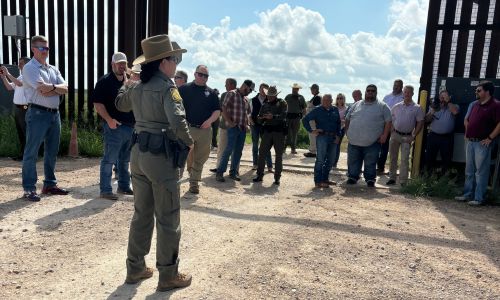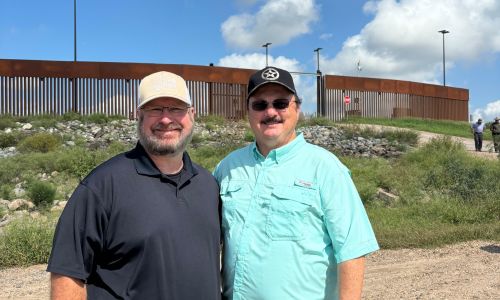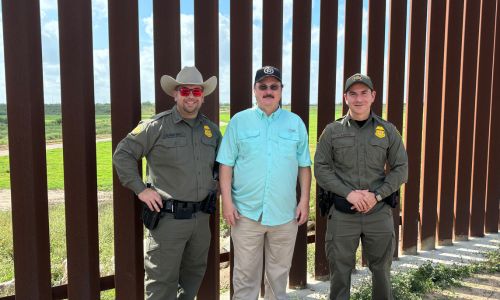Calhoun County, AL – In a recent visit to the Texas border, Senator Keith Kelley and Sheriff Matthew Wade shared critical observations that illuminate the pressing issues surrounding immigration and border security, connecting these national challenges to local communities like Sylacauga, Alabama. The duo emphasized the importance of educating local leaders about the realities faced at the border, where they witnessed alarming practices among charitable organizations that may be profiting from vulnerable immigrants. Their reflections highlight the urgent need for comprehensive solutions to the complexities posed by the influx of migrants and the ongoing struggles faced by border patrol agents, who report feeling unsupported in their efforts to maintain security and oversight. As the local landscape shifts with the arrival of new populations, Kelley and Wade call for collaborative efforts among state and local governments to effectively address these intricate issues that resonate far beyond the southern border.
Senator Kelley’s view:
Senator Keith Kelley recently shared his insights from a trip to the Texas border, highlighting the urgent issues surrounding immigration and border security while drawing attention to the local impacts of these national challenges. He extended an invitation to his local sheriff to join him, emphasizing the importance of educating legislators and law enforcement about the realities at the border. During his visit, Kelley observed concerning practices among charitable organizations that appear to profit significantly, potentially engaging in human trafficking. He noted, “Many of these charities provide immigrants with preloaded cards and phones, raising questions about the true nature of the assistance being offered.” He reported that immigrants often receive substantial financial aid, allowing them to sustain themselves temporarily before moving on to various states, with one group he encountered having traveled from Guatemala.
Kelley also conveyed the frustration expressed by Border Patrol agents, who feel unsupported by the current presidential administration. “The agents are disheartened by the lack of support, which leads to a significant lack of security and oversight,” he explained. He further described alarming conditions faced by women and children crossing the border, revealing that some women are given emergency contraceptives due to high risks of assault. Kelley emphasized the pervasive control drug cartels have over migration routes and highlighted the dangers posed by the environment, stating, “The threats from wildlife are just one part of a much larger picture of danger.”
A particular local concern that Kelley highlighted was the recent influx of Haitian immigrants in Sylacauga, Alabama. This surge has raised questions about the community’s capacity to integrate newcomers, particularly given the cultural differences and the economic strain it may impose. Kelley remarked, “We need to be prepared for the impact on our schools, healthcare systems, and housing. Sylacauga is a close-knit community, and while we want to help those in need, we also need to ensure our residents are not overlooked.”
The senator expressed concern about the inadequate vetting process for immigrants, especially those arriving from countries without reliable documentation. “People are being released into the U.S. without thorough background checks, and we have no way of knowing who they are,” he remarked. He also noted the increase in criminal activity, mentioning armed individuals crossing the border to transport drugs like fentanyl. Kelley asserted that this escalating violence directly impacts communities, stating, “The misconceptions about immigrants, fueled by media narratives, contribute to fears and uncertainties in local areas.”
Kelley underscored the importance of local leaders being informed and prepared for these challenges, as the recent Haitian influx is already affecting community dynamics. He emphasized the need for collaboration between federal, state, and local governments to address the complexities of immigration. “It’s crucial for legislators to recognize how these issues impact everyone, regardless of how far they are from the border,” he concluded. Ultimately, Kelley’s experience at the border has profoundly shaped his understanding of immigration issues, prompting him to advocate for more comprehensive approaches at both state and federal levels. He intends to use the knowledge gained from this visit to be better inform when it comes to legislative actions and address the intricate challenges facing communities affected by immigration.
Sherriff Wade’s View:
Sheriff Matthew Wade recently participated in a significant trip to McAllen, Texas, organized by the Federation for American Immigration Reform (F.A.I.R.). Alongside eight Alabama sheriffs and ten Alabama state senators, including Senator Keith Kelley, Wade aimed to gain firsthand insights into the complexities of the border crisis through training from U.S. Border Patrol agents and discussions with Texas Border Czar Michael Banks.
One of the key takeaways from the trip was the realization that the border crisis is not confined to the southern border but resonates throughout the entire United States. Individuals crossing illegally often disperse into various states, with an alarming diversity among them. Wade noted that many migrants are not just from Mexico but also hail from countries like the Middle East, China, and Russia, alongside those from Haiti and Venezuela. This situation has transformed into a national security issue, affecting communities far removed from the border.
During the trip, two primary categories of illegal border crossers were highlighted. The first group seeks out Border Patrol agents upon crossing, turning themselves in for processing. These individuals are transferred to Non-Governmental Organizations (NGOs) that provide assistance, such as cell phones and debit cards. While many claim to have sponsors within the U.S., there is a lack of clarity regarding the legality of these sponsors’ statuses. The second group includes those who evade detection, such as drug cartel members, terrorists, and other criminals, representing the most significant threat to national security. Wade cautioned that the risk of another terrorist attack similar to 9/11 could become a reality if these individuals successfully infiltrate the country.
Wade also discussed Texas Governor Greg Abbott’s aggressive measures to address illegal crossings, including the appointment of Michael Banks as the Border Czar. Abbott has empowered Banks to utilize the Texas Department of Public Safety to arrest individuals crossing the border illegally. While these measures have effectively reduced crossings in Texas, Wade noted that they have merely shifted the problem to neighboring states like Arizona and California. The repercussions of the border crisis are also being felt in Alabama, with cities such as Sylacauga and Albertville experiencing a notable influx of Haitian immigrants. Despite many of these individuals claiming to have sponsors, the ambiguity surrounding these sponsors’ legal statuses raises concerns. Wade underscored the common misconception that having a sponsor equates to being in the U.S. legally, emphasizing that this is not always the case.
The trip also revealed troubling deficiencies in border security resources. For instance, Wade observed an incomplete section of the border wall, halted due to funding issues after President Biden’s administration took office. Additionally, he learned that out of eleven surveillance cameras in the McAllen area, ten were inoperable, with repairs pending for over a year. Border Patrol agents conveyed frustration over these equipment failures and the impact of current policies on their operational effectiveness.
During the visit, the group met with a local NGO led by a Catholic nun known as the “BMW Nun” because of her luxury car. Wade expressed concern about the financial motivations of NGOs that receive $1,500 daily to assist illegal immigrants, which raises ethical questions about profiting from a humanitarian crisis. He also noted that on the Mexican side of the border, women are provided with rape kits to address the high incidence of sexual assault during their perilous journeys.
One of the most shocking revelations was the control drug cartels exert over border crossings. Each individual crossing must pay between $6,000 and $10,000 to these cartels, which manage their operations more efficiently than U.S. authorities. This stark reality underscores the intertwined nature of security and humanitarian issues at the border.
Sheriff Wade stressed the urgent need for reform in immigration policy and border security measures. According to Border Patrol agents, the current crisis is the worst they have witnessed, and Wade attributed this deterioration to policies enacted by the current administration, which have restricted the agents’ abilities to effectively manage the situation. He called for unity across political lines, urging fellow law enforcement officials and policymakers to remain informed and take decisive action. Wade believes that addressing the border crisis requires a collaborative approach, prioritizing national security and the safety of vulnerable populations. As an American committed to protecting his country, he insists that collective efforts can lead to meaningful changes that safeguard lives and restore order at the border.
Senator Keith Kelley and Sheriff Matthew Wade’s insights from their visit to the Texas border highlight the urgent need for a multifaceted approach to immigration and border security that addresses both national and local implications. Their firsthand experiences reveal a complex situation that goes beyond mere policy discussions, affecting communities like Sylacauga in profound ways. As they advocate for increased collaboration among local, state, and federal entities, it becomes clear that understanding the realities faced by those at the border is crucial for formulating effective responses to the challenges of migration, safety, and community integration. With rising concerns about national security and the pressures placed on local resources, Kelley and Wade’s call for informed leadership and decisive action serves as a rallying point for stakeholders at all levels to engage in meaningful dialogue and take proactive steps toward sustainable solutions.
















